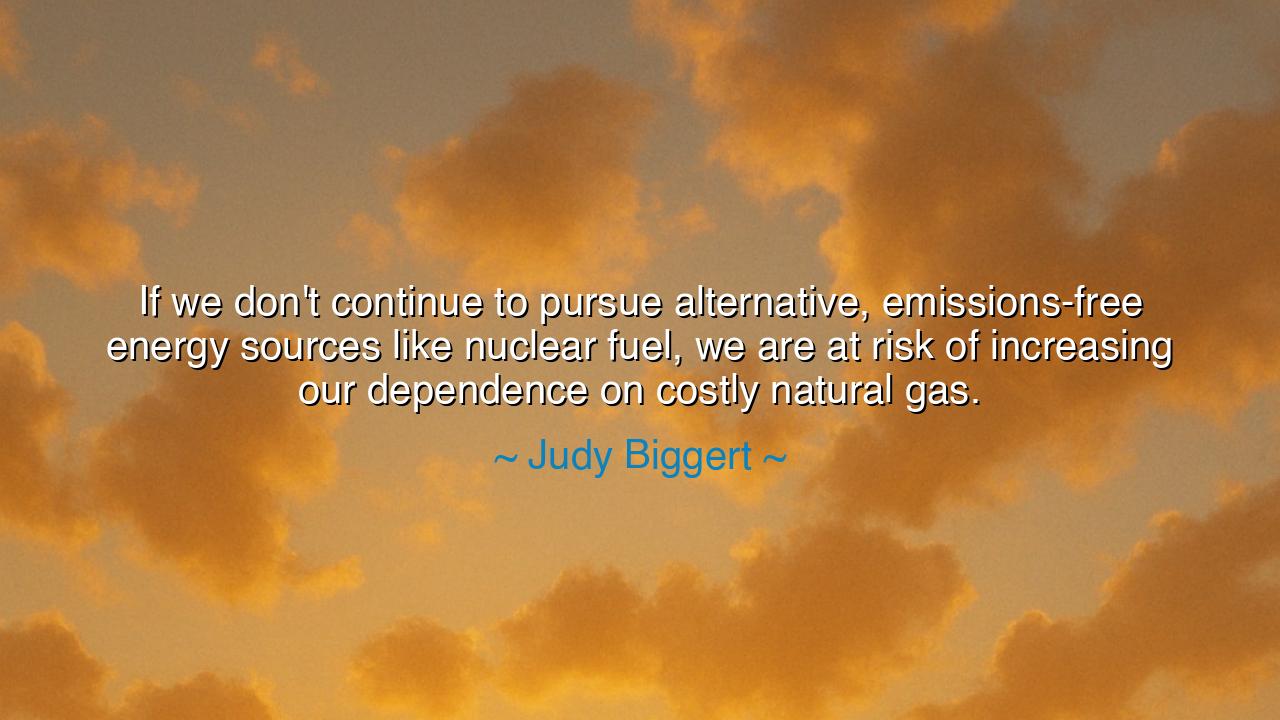
If we don't continue to pursue alternative, emissions-free energy
If we don't continue to pursue alternative, emissions-free energy sources like nuclear fuel, we are at risk of increasing our dependence on costly natural gas.





When Judy Biggert declared, “If we don't continue to pursue alternative, emissions-free energy sources like nuclear fuel, we are at risk of increasing our dependence on costly natural gas,” she spoke with the clarity of one who sees both the promise and peril of the modern age. Her words are not merely technical—they are prophetic. Beneath them lies a truth older than civilization itself: that the fate of nations is tied to the sources of their energy, and that dependence, whether upon fuel or upon fortune, has always been the beginning of decline. Biggert’s statement calls humanity to wisdom in stewardship, to courage in innovation, and to foresight in survival. She reminds us that progress demands not comfort, but vision.
In the tone of the ancients, her teaching is an echo of the eternal principle of balance—that every society must learn to draw strength from nature without destroying it. Fire gave man the power to cook, to forge, to build—and to wage war. So too, in our own time, the fire of fossil fuels has lifted civilizations to great heights, yet also threatened to consume the world that gave them birth. Biggert’s words urge us to temper our power with understanding, to move beyond the addiction of convenience toward the discipline of foresight. To rely endlessly on what is easy—whether it be oil, gas, or coal—is to become a servant of the very forces we once mastered.
Throughout history, those who failed to innovate have perished. Consider the tale of ancient Mesopotamia, whose once-fertile lands became barren through overuse and deforestation. The people who had harnessed rivers to nourish their crops ultimately drained the life from their soil. Their greatness, built on abundance, withered into dust. Biggert’s warning carries the same message for the modern world: if we cling too long to familiar sources of power, we will exhaust the Earth and impoverish ourselves. Energy, like the soul, must be renewed—not through reckless indulgence, but through courage to explore what is new and unknown.
In speaking of nuclear energy, Biggert invokes both promise and fear—the twin forces that have always accompanied the pursuit of power. For many, nuclear fuel symbolizes danger; yet for others, it represents humanity’s greatest leap toward clean, boundless energy. The ancients would have understood this duality, for Prometheus himself was punished for bringing fire to man. But Biggert’s point is that fear must not paralyze the will to progress. The path to sustainability requires not retreat, but refinement—to harness the atom not as a weapon, but as a wellspring of life. For in the measured and ethical pursuit of such power lies the salvation of both economy and environment.
Her warning against dependence on costly natural gas is more than economic—it is moral. Dependence weakens the will, and nations, like individuals, must learn to stand upon their own strength. To build a future upon scarcity is to invite conflict; to build it upon renewal is to invite peace. When a nation binds itself to volatile sources of energy, it becomes enslaved to the shifting tides of trade, politics, and war. But when it invests in clean, self-sustaining sources, it gains freedom—not only from others, but from the weight of its own excess. Biggert’s words, therefore, are not about energy alone—they are about the spirit of self-reliance and the moral duty of stewardship.
The world has already glimpsed both sides of this truth. In the aftermath of the 1973 oil crisis, nations learned the cost of dependence. Fuel shortages brought economies to their knees, revealing that power built upon scarcity is no power at all. Yet out of that crisis rose new visions—renewables, conservation, efficiency. Humanity learned, painfully but clearly, that the future belongs not to those who consume most, but to those who adapt best. Biggert’s call to pursue nuclear and other clean energies continues that lineage of wisdom: to seek stability through transformation, and abundance through restraint.
Let this be the lesson passed to the generations that follow: progress must serve the Earth, not devour it. The wise must pursue innovation not with greed, but with gratitude; not with fear, but with faith in our capacity to grow responsibly. The fire of the atom, the wind’s breath, the sun’s gift—all are tools of life, if wielded with reverence. Biggert’s words remind us that the choice is ours: we may cling to the fleeting comfort of what we know, or rise boldly into the future, forging harmony between human ambition and planetary balance. For only when energy and ethics walk hand in hand will humanity fulfill its highest purpose—not to dominate creation, but to dwell within it wisely, as its rightful guardian.






AAdministratorAdministrator
Welcome, honored guests. Please leave a comment, we will respond soon